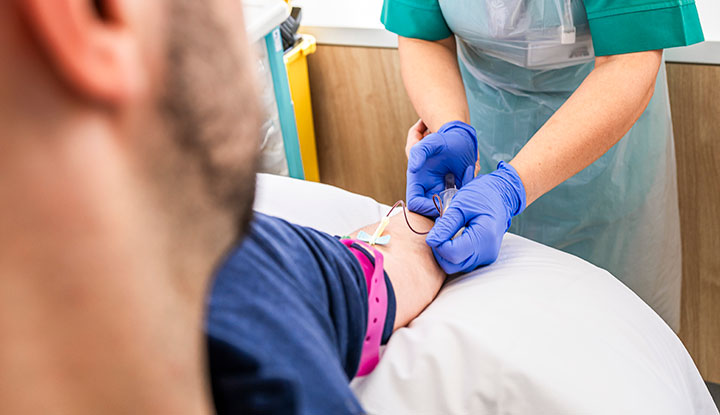Calcium is an essential mineral in your body. Calcium blood tests check to make sure you have the right level of calcium in your blood to be healthy. If you have high or low levels of calcium in your blood, it may mean you have certain medical conditions.
Advertisement
Cleveland Clinic is a non-profit academic medical center. Advertising on our site helps support our mission. We do not endorse non-Cleveland Clinic products or services. Policy

Image content: This image is available to view online.
View image online (https://my.clevelandclinic.org/-/scassets/images/org/health/articles/22021-calcium-blood-test)
A calcium blood test measures the level of calcium in your blood.
Advertisement
Cleveland Clinic is a non-profit academic medical center. Advertising on our site helps support our mission. We do not endorse non-Cleveland Clinic products or services. Policy
There are two types of calcium blood tests:
Calcium is one of the most important and common minerals in your body. About 99% of your body’s calcium is in your bones and teeth. The other 1% of it is in your blood.
A calcium blood test can’t show how much calcium is in your bones. Your healthcare provider can check your bone health with a bone density test (DEXA scan).
You may need a calcium blood test for one of four reasons:
You don’t need to follow any special instructions before a calcium blood test if it’s your only test.
Advertisement
The test may be part of a basic or comprehensive metabolic panel. These tests measure multiple substances in your blood. In this case, you may need to not eat or drink (fast) for several hours before your blood draw. Your healthcare provider will let you know if you need to follow any special instructions.
You can expect to experience the following during a blood test, or blood draw:
The entire procedure usually takes less than five minutes.
In most cases, you should have your test results within one or two days, though it could take longer.
After the phlebotomist has collected your blood sample, they’ll send it to a laboratory for testing. Once the test results are back, your healthcare provider will share the results with you.
Blood test reports, including calcium blood test reports, usually provide:
In most cases, a normal blood calcium level for adults is 8.5 to 10.2 milligrams/deciliter (2.15 to 2.55 millimoles/liter). But laboratories may have different reference ranges for normal blood calcium levels. You shouldn’t compare values from one laboratory to normal ranges from another laboratory.
When you get the results, there’ll be information that indicates what that lab’s normal blood calcium range is. If you have any questions about your results, be sure to ask your healthcare provider.
If your results reveal that you have higher-than-normal levels of calcium in your blood, you may have:
It’s important to remember that a high calcium result doesn’t necessarily mean that you have a medical condition. Certain medications can also increase your blood calcium levels.
Advertisement
If your results reveal that you have lower-than-normal levels of calcium in your blood, you may have:
A low calcium result doesn’t necessarily mean you have a medical condition. Certain medications and eating patterns can also decrease your blood calcium levels.
If you have high or low blood calcium results, it doesn’t guarantee you have a medical condition. Other factors, like what you eat and certain medications, can affect your calcium levels. There could’ve also been an error in the collection, transport or processing of the test.
If you have an abnormal result, your healthcare provider may order more tests to find the cause of the abnormal levels. These tests may measure your:
If you have questions about your results, don’t hesitate to ask your healthcare provider.
If you have concerning symptoms of hypocalcemia or hypercalcemia, contact your healthcare provider as soon as possible.
Seeing an abnormal test result can be stressful. Know that having a high or low level of blood calcium doesn’t necessarily mean you have a medical condition and need treatment. Try to take a deep breath. And know that your healthcare provider will tell you if you need to get more tests to find answers.
Advertisement

Sign up for our Health Essentials emails for expert guidance on nutrition, fitness, sleep, skin care and more.
Learn more about the Health Library and our editorial process.
Cleveland Clinic’s health articles are based on evidence-backed information and review by medical professionals to ensure accuracy, reliability and up-to-date clinical standards.
Cleveland Clinic’s health articles are based on evidence-backed information and review by medical professionals to ensure accuracy, reliability and up-to-date clinical standards.
Cleveland Clinic’s primary care providers offer lifelong medical care. From sinus infections and high blood pressure to preventive screening, we’re here for you.
